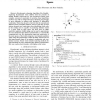Free Online Productivity Tools
i2Speak
i2Symbol
i2OCR
iTex2Img
iWeb2Print
iWeb2Shot
i2Type
iPdf2Split
iPdf2Merge
i2Bopomofo
i2Arabic
i2Style
i2Image
i2PDF
iLatex2Rtf
Sci2ools
ICRA
2010
IEEE
2010
IEEE
A quadratic regulator-based heuristic for rapidly exploring state space
Abstract— Kinodynamic planning algorithms like RapidlyExploring Randomized Trees (RRTs) hold the promise of finding feasible trajectories for rich dynamical systems with complex, nonconvex constraints. In practice, these algorithms perform very well on configuration space planning, but struggle to grow efficiently in systems with dynamics or differential constraints. This is due in part to the fact that the conventional distance metric, Euclidean distance, does not take into account system dynamics and constraints when identifying which node in the existing tree is capable of producing children closest to a given point in state space. We show that an affine quadratic regulator (AQR) design can be used to approximate the exact minimum-time distance pseudometric at a reasonable computational cost. We demonstrate improved exploration of the state spaces of the double integrator and simple pendulum when using this pseudometric within the RRT framework, but this improvement drops off ...
Exact Minimum-time Distance | ICRA 2010 | Minimum-time Distance Pseudometric | Rich Dynamical Systems | Robotics |
| Added | 26 Jan 2011 |
| Updated | 26 Jan 2011 |
| Type | Journal |
| Year | 2010 |
| Where | ICRA |
| Authors | Elena Leah Glassman, Russ Tedrake |
Comments (0)

